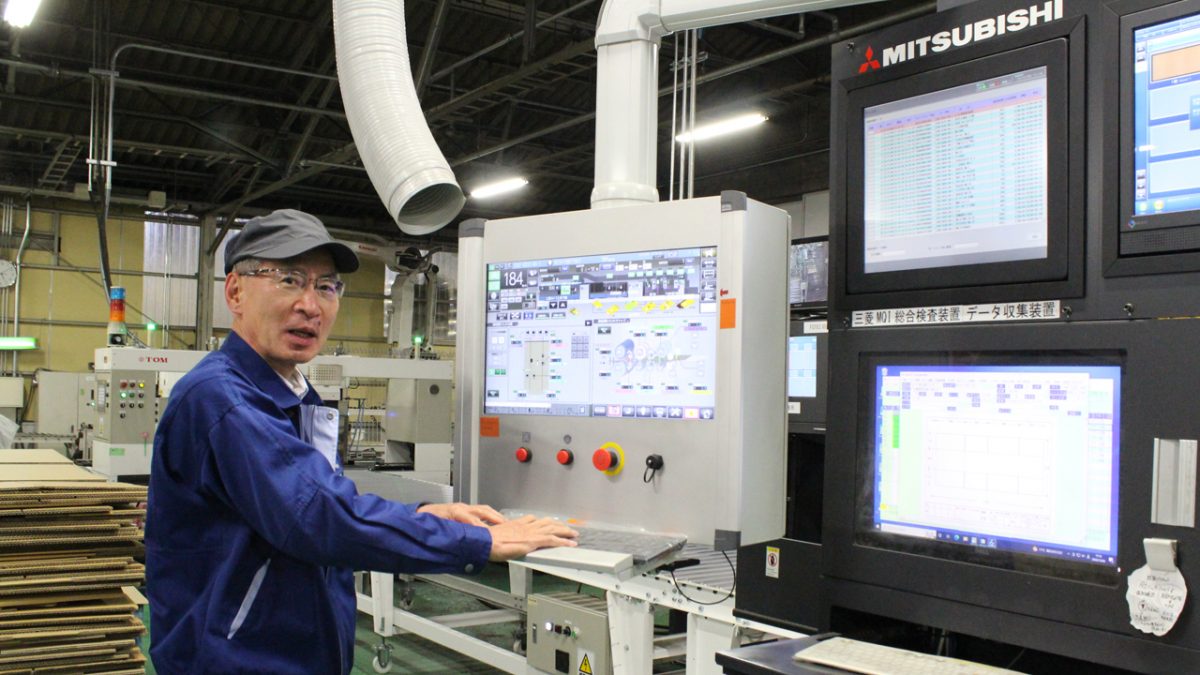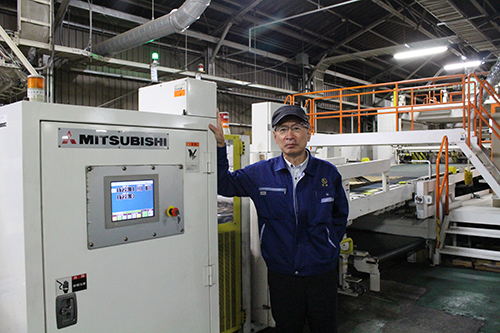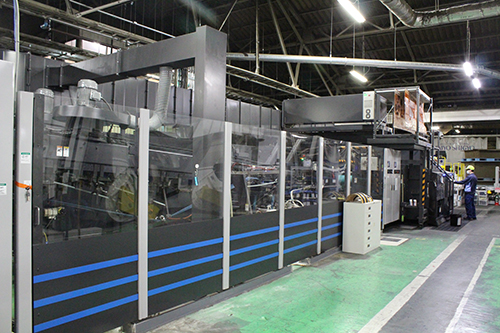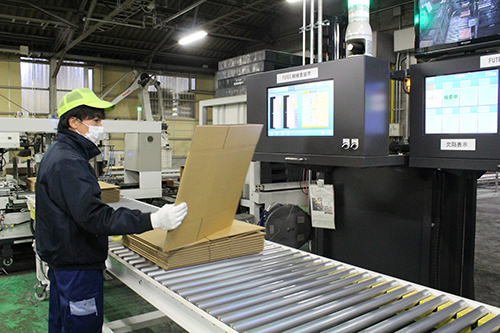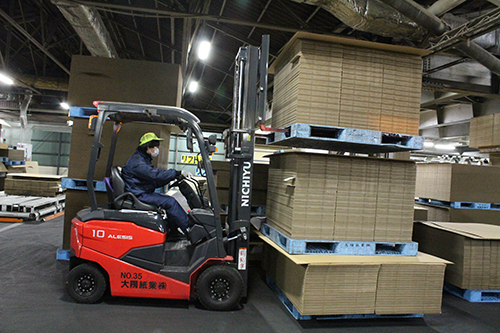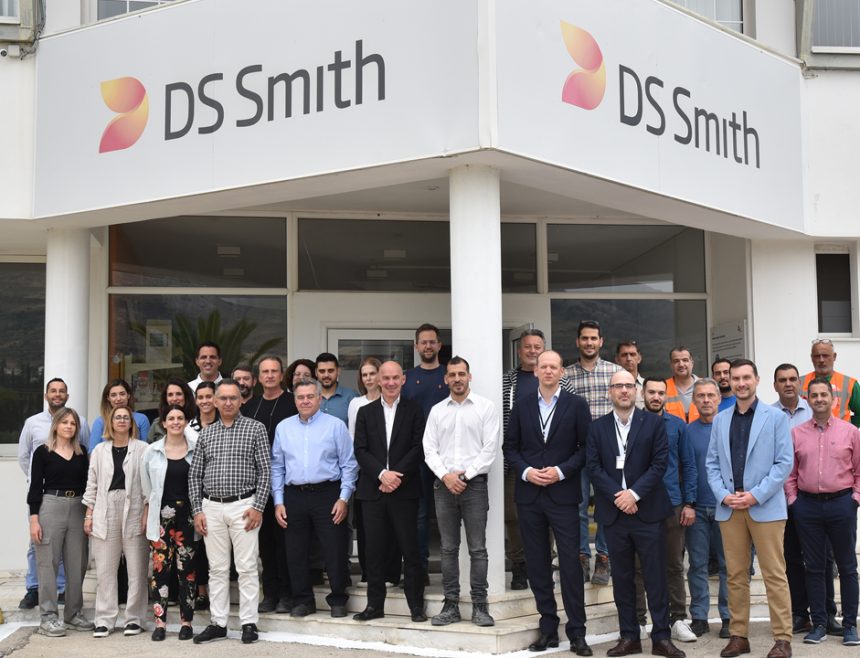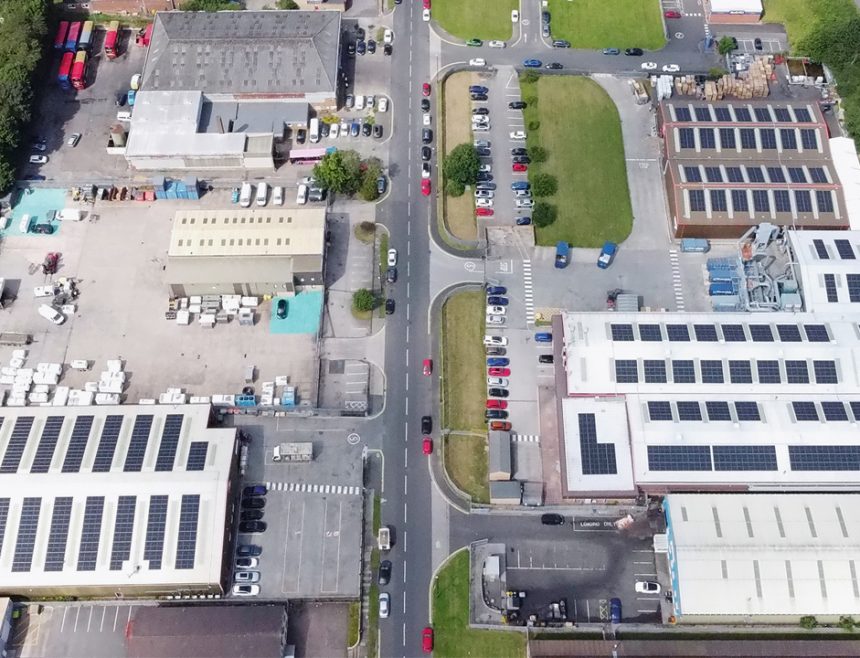One of the early buyers of the popular new model in Japan is Taiyo Shigyo of Osaka, which recently installed a new Mitsubishi 4-colour MC-100 flexo folder gluer to replace a larger, older FFG and obtain greater flexibility and productivity, with energy saving in its plant.
Mitsubishi Heavy Industries Machinery Systems Ltd’s (MHI-MS) introduction of its space-saving MC-100 FFG, with its many special features, has attracted strong interest among domestic and overseas customers looking to install a high performance casemaker, but maybe only have limited space available for a new machine.
“Our new MC-100 is a replacement machine for our old Shinko FFG which is a longer machine, so there was no space to inspect the finished box products,” said Masayoshi Maeda, Executive Director, Taiyo Shigyo. “We needed a compact machine to create space for finished product inspection. There is a 4m difference in length between our new Mitsubishi MC-100 and our old Shinko – 4m difference in length is a lot here in Japan, especially as space is a premium. We need compact machines because of our factory’s space constraints. The area surrounding our plant is residential, so there is limited space for us to work in.”
Established in 1937, Taiyo Shigyo’s factory is located in Moriguchi City in North Osaki, in the outskirts of Osaka. In addition to its new MC-100, Taiyo Shigyo has a Mitsubishi EVOL-84 and an additional casemaker from another Japanese supplier.
Taiyo Shigyo produces its own corrugated board, operating a corrugating line for which MHS-MS supplied the double facer, the cut-off and the stacker, while other units are from another Japanese supplier.
Game Changer
Developed initially for a different market portfolio and designed to handle short orders, the MC-100 operates at a lower maximum speed than the EVOL, for improved energy saving and offers a number of other important features.
“We chose the new four-colour MC-100 for its accuracy, quality and productivity. Our new machine has the same accuracy of folding as our EVOL-84,” Maeda confirmed. “We have a lot of short orders, so we need a quick order change; also, when changing the print stereo, which is done from the platform above the print units, the operator does not need to move around, unlike with the EVOL where access steps are used on each print unit to change the print stereo.”
MHI-MS launched the MC-100 in 2020 aiming at different market segments to its flagship EVOL FFG series. Although the high performance EVOL is the FFG of choice for many large converters, it does not always suit medium size box plants for whom the MC-100’s specifications may be better-suited. Mitsubishi’s MC-100 design concept of space saving with wide operational flexibility suits Taiyo Shigyo’s requirements.
The maximum and minimum sheet sizes that the MC-100 is designed to handle are both larger and smaller than those that the EVOL is able to handle. Also, the maximum unfolding operational sheet size for the MC-100 is 1800mm while for the EVOL it is 1600mm.
“On our MC-100 we can choose to print with two, three or all four colours,” Maeda said. “Our company does a lot of short orders, so all these flexible features are very useful. Also, the minimum/maximum speed on our model is from 50 to 250 blanks per minute, so we can vary the speeds which is useful as we get many short orders.”
MHI-MS has designed the MC-100 to operate at a maximum speed of 300 boxes per min, depending on market needs. The MC-100 compares with the EVOL-115 which operates at a maximum 330 boxes per min, and the EVOL-100 which is designed to run at 350 boxes per min.
In terms of space saving, Taiyo Shigyo’s MC-100 is 19.8m in length, some 2m shorter than the EVOL-100 which measures 21.9m in length, and (as noted earlier) about 4m shorter than the company’s old Shinko that it has replaced. Mitsubishi’s three-colour MC-100, by comparison, measures 18.9m in length and is 3m shorter than the four-colour EVOL-100.
Short Order Performance
Meanwhile, data detailing the large number of small orders that Taiyo Shigyo handles daily may come as a surprise to some readers who live outside Japan. On the day we visited, Taiyo Shigyo’s three FFGs completed 352 orders in total, which involved making a total of 123,472 boxes from 90,926 sqm of board, a work load that is about 90% of the company’s normal daily production volume.
“The FFG we use for an order depends on the box size. The small boxes we give to the EVOL-84, mid size boxes to the MC-100 and then the largest boxes to our other FFG,” Maeda said. “We specialise in producing small to medium production lots. We cannot do large-size orders because of our limited factory space.”
Asked about monthly production of short orders, in one recent month (October 2022), according to Maeda, the new MC-100 produced an average of 35,000 boxes daily; the EVOL-84 produced a daily average of 68,000 cases; while the other FFG, which is a three-colour model, produced a daily average of 23,000 boxes.
On the day we visited Taiyo Shigyo’s plant, the company operated the MC-100 from 08:30 to 17:52 to complete 128 separate jobs, using 28,023 sqm of board to make 30,127 medium-size boxes.
The EVOL-84, running from 08:30 to 18:15 (including overtime) completed 117 orders, using 29,393 sqm of board to produce 63,498 small boxes. The other FFG, also running from 08:30 to 18:15 (including overtime) completed 107 jobs, using 33,510 sqm of board to produce 29,847 large boxes.
“About 83% of our boxes are singlewall, mostly in A flute, and 17% are doublewall,” Maeda said. “Doublewall boxes are used to pack mechanical parts, especially aluminum or steel car wheel hubs which are packed in corrugated cases. All our materials costs have increased – paper, gas and other materials. To reduce box prices, we suggest to customers to reduce the fluting and liner grammage or to reduce the box thickness from double to singlewall.”
Box orders from local customers supplying goods to the Japanese market have remained stable recently. However, many customers packing goods for export have experienced a decrease in export orders.
“The pandemic effect on our business has been that overall our production volumes have decreased by five percent,” Maeda said. “Generally, every type of export goods have been affected – such as food, textiles and other goods. Also, domestic consumption in Japan has become weaker recently due to higher energy prices.”
Taiyo Shigyo supplies customers within a 30km radius of Osaka Prefecture. “Transport is an issue – if we transport boxes a long distance there will be other corrugating companies in that customer’s area,” Maeda added. “With small orders, if we are delivering these a long distance then our truck takes longer to return. This may interfere with our local area sales if the delivery truck gets delayed.”
Maeda concludes, “We really enjoy using MC-100, realising space saving, more flexibility such as wider range of paper size with double feed, quicker set-up time, and less energy consumption.”

